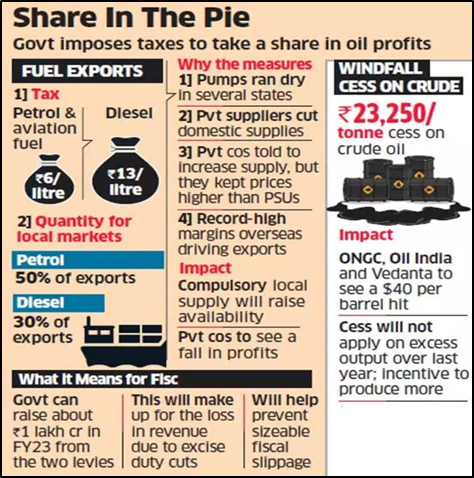In News:
- The government slapped an export tax on petrol, diesel and jet fuel (ATF) shipped overseas, and imposed a windfall tax on crude oil produced locally.
What’s in Today’s Article:
- Windfall Tax – About, windfall in current situation
- News Summary
Windfall tax
- A windfall tax is a tax levied by governments against certain industries when economic conditions allow those industries to experience above-average profits.
- The idea is to target firms that were lucky enough to benefit from something they were not responsible for - in other words, a windfall.
- In other words, windfall tax is imposed on companies that have seen their profits extraordinarily not because of any clever investment decision or an increase in efficiency or innovation, but simply because of favourable market conditions.
- In May 2022, the UK levied a 25% tax on extraordinary profits from North Sea oil and gas production.
Windfall for oil companies in current situation
- Russia’s attack on Ukraine has upset the supply chain.
- Also, the world is emerging from the pandemic and the demand for oil has increased compared to last year.
- These two factors have led to the steep rise in crude oil prices. As a result of which, oil and gas companies around the world are minting money.
- And these gains are not coming because of any improvement in their processes but because of the geopolitical situation.
News Summary
- The government has imposed a windfall tax on crude oil produced locally and also levied additional excise duty on exports of petrol, diesel and aviation turbine fuel.
- These taxes have been imposed to temper domestic fuel retail prices and ensure availability.
Key Highlights:

- Export duties on petrol, diesel and ATF increased
- The government on Friday raised export duty on diesel by Rs 13/litre and that on petrol by Rs 6/litre.
- The government also imposed a cess of Rs 6 per litre on exports of ATF.
- Windfall tax on domestically produced crude oil
- The government also slapped a Rs 23,230 per tonne additional tax on domestically produced crude oil to take away windfall gains accruing to producers from high international oil prices.
- Small producers, whose annual production of crude in the preceding financial year is less than 2 million barrels will be exempt from this cess.
Why these taxes have been imposed?
- To address the shortage of fuel at retail outlets in the country
- The shortage of fuel at retail outlets was because oil marketing companies were not willing to sell fuel at a loss.
- Fuel prices have not increased despite rising crude and depreciating rupee.
- As a result, oil marketing companies started losing Rs 20-25 per litre on diesel and Rs 10-15 per litre on petrol.
- Private oil marketing companies were exporting petrol and diesel to foreign countries like Australia for better realisation.
- The move will discourage companies from exporting petrol and diesel.
- Better revenue realisation
- The move will fetch more revenue to the exchequer.
- These taxes will make up for more than three-fourths of the revenue that the government lost when it cut excise duty on petrol and diesel to cool soaring inflation.
- The government had in May cut excise duty on petrol by Rs 8 per litre and diesel by Rs 6 a litre to cool record inflation.










